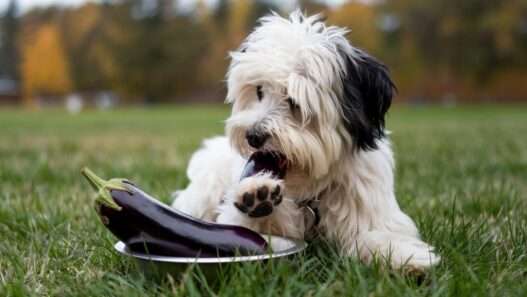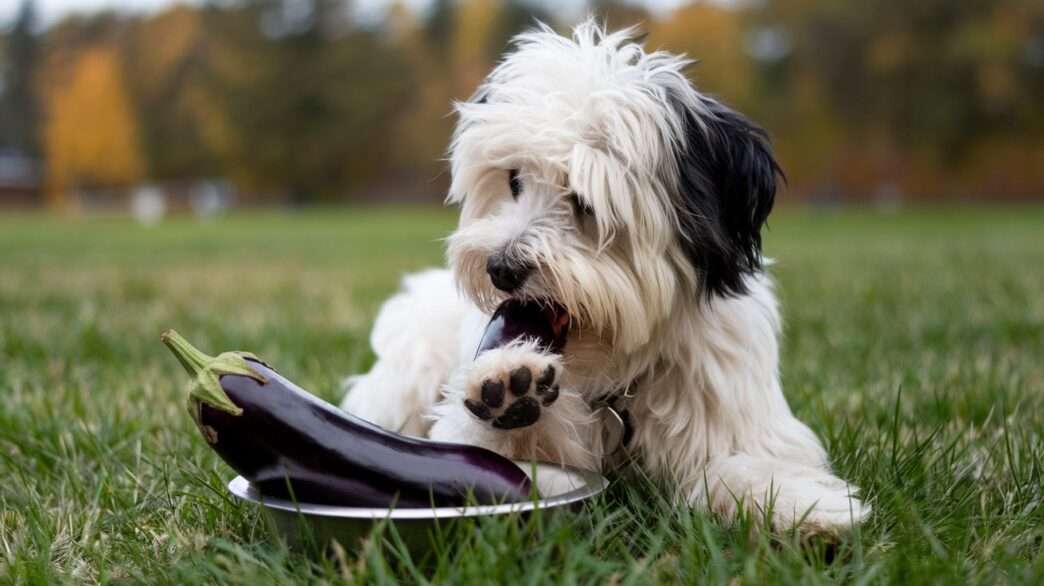Eggplant is generally not toxic to dogs, but it’s not the best choice for them either. It belongs to the nightshade family, which can cause digestive upset or other issues in some dogs. If you do decide to give your dog eggplant, make sure it’s cooked and served in small amounts, and watch for any adverse reactions. Always consult your vet before introducing new foods into your dog’s diet.
Can dogs eat eggplant cooked?
Yes, dogs can eat cooked eggplant in moderation. Cooking the eggplant helps make it easier to digest and reduces the risk of potential toxins. Be sure to cook it plain, without any added salt, spices, or oils, which can be harmful to dogs. Start with a small amount to see how your dog reacts, and consult your vet if you have any concerns.
Can dogs eat raw eggplant?
– Raw Eggplant: Generally not recommended for dogs.
– Digestibility: Raw eggplant can be difficult for dogs to digest.
– Toxins: Contains solanine, a compound that can be harmful in large amounts.
– Risk: May cause gastrointestinal upset, such as vomiting or diarrhea.
– Recommendation: Always cook eggplant if you decide to feed it to your dog, and consult your vet for advice.
Can dogs eat eggplant parmesan?
Dogs should not eat eggplant parmesan. While eggplant itself can be safe in small, cooked portions, eggplant parmesan typically includes ingredients that are harmful to dogs, such as cheese, garlic, and other seasonings. These ingredients can cause digestive upset, and garlic in particular is toxic to dogs.
Additionally, the heavy, cheesy sauce is not ideal for canine digestion. If you want to give your dog eggplant, it’s best to prepare it plain and cooked without any added ingredients. Always consult your vet before introducing new foods into your dog’s diet.
Can dogs eat eggplant parm?
– Eggplant: Cooked eggplant in small amounts is generally safe for dogs.
– Parmesan Cheese: High in fat and sodium, which can upset a dog’s stomach.
– Garlic: Often used in eggplant parm recipes, and is toxic to dogs.
– Seasonings: Additional seasonings and spices can be harmful.
– Recommendation: Avoid feeding your dog eggplant parm and stick to plain, cooked eggplant if you want to share it.
Can dogs eat eggplant leaves?
Dogs should not eat eggplant leaves. The leaves of the eggplant plant contain solanine and other compounds that can be toxic to dogs. Consuming eggplant leaves can lead to gastrointestinal issues, such as vomiting or diarrhea, and potentially more serious health problems. It’s best to keep eggplant leaves away from your dog and only offer them safe, dog-friendly foods. If you’re unsure about what foods are appropriate for your pet, consulting your vet is always a good idea.
How To Safely Prepare Eggplant for Your Dog?
To safely prepare eggplant for your dog, follow these detailed steps:
1. Choose the Right Eggplant: Select a fresh, firm eggplant. Avoid any that are overly ripe, bruised, or have signs of mold.
2. Wash Thoroughly: Rinse the eggplant under running water to remove any dirt or pesticide residues.
3. Peel the Eggplant: Remove the skin, as it can be tougher and more difficult for dogs to digest.
4. Remove Seeds: Although eggplant seeds are not toxic, it’s best to remove them to prevent any potential digestive issues.
5. Cook Properly:
– Boiling: Cut the eggplant into small, bite-sized pieces and boil until tender. This typically takes about 5-10 minutes.
– Steaming: Cut the eggplant into pieces and steam until soft, which usually takes about 7-10 minutes.
– Baking: You can also bake eggplant pieces at 375°F (190°C) for about 20-30 minutes, but avoid adding any oils or seasonings.
6. Cool Down: Let the cooked eggplant cool completely before serving it to your dog. Hot food can cause burns or discomfort.
7. Serve in Moderation: Offer only a small portion of the cooked eggplant to your dog. A few small pieces as an occasional treat is sufficient.
8. Monitor for Reactions: After introducing eggplant into your dog’s diet, keep an eye out for any adverse reactions like vomiting, diarrhea, or changes in behavior. If you notice any issues, stop feeding eggplant and consult your vet.
9. Avoid Additives: Ensure the eggplant is served plain without any added ingredients such as salt, spices, oils, or sauces, which can be harmful to dogs.
10. Consult Your Vet: Before making any significant changes to your dog’s diet or introducing new foods, consult your veterinarian to ensure it’s appropriate for your dog’s specific health needs and dietary requirements.


























